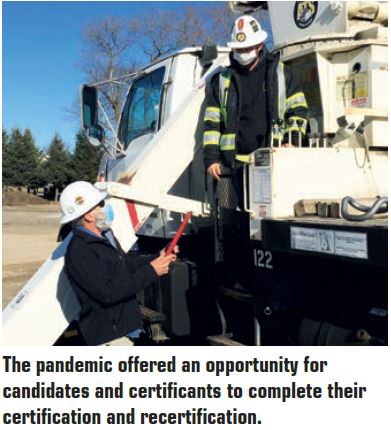Navigating certification and recertification during the pandemic
By NCCCO CEO Thom Sicklesteel
February 26, 2021—The Department of Homeland Security identified operators of cranes used in construction as “essential.” Due to this designation, and because Federal OSHA requires these operators to be certified, the National Commission for the Certification of Crane Operators is also considered by the Department of Homeland Security to be part of the “essential critical infrastructure workforce.” This has resulted in NCCCO being able to continue testing throughout COVID-19 with little disruption. As the COVID-19 pandemic goes through a surge heading into 2021, NCCCO continues to test within the rules set forth by local jurisdictions.
 While the pandemic has been unpredictable, this time of uncertainty has been an excellent opportunity for candidates and certificants to complete their certification(s) and/or recertification(s), ensuring that they are ready to work when opportunity arises. Others have taken advantage of this time to add new CCO certifications to their portfolios, making them even more employable. Certification remains a valuable tool to show employers that one has the knowledge and skills to perform those jobs safely and efficiently. Holding one or more CCO certifications—fair, valid, reliable, and defensible endorsements of one’s knowledge and abilities—sets those candidates above others competing for the same position.
While the pandemic has been unpredictable, this time of uncertainty has been an excellent opportunity for candidates and certificants to complete their certification(s) and/or recertification(s), ensuring that they are ready to work when opportunity arises. Others have taken advantage of this time to add new CCO certifications to their portfolios, making them even more employable. Certification remains a valuable tool to show employers that one has the knowledge and skills to perform those jobs safely and efficiently. Holding one or more CCO certifications—fair, valid, reliable, and defensible endorsements of one’s knowledge and abilities—sets those candidates above others competing for the same position.
Likewise, employers have certification front and center. Although the economy has slowed due to the pandemic, most employers understand the importance of keeping their workforce ready as work picks up. Contractors do not want to be in a position of having a shortage of certified employees, or worse, scramble to get employees certified, causing work to be awarded to a more prepared company.
NCCCO has implemented new protocols that permit continued written (paper/pencil and computer-based) and practical testing safely. With social distancing and frequent disinfecting, candidates and certificants—and those who administer the exams—can continue testing in a safe environment. Candidates who are ill, (presenting with fever, cough, respiratory and/or flu-like symptoms), are not permitted to test and should adhere to the emergency cancellation policy in the candidate handbook.
NCCCO continues to work with Test Site Coordinators (TSCs) to schedule and hold paper/pencil test (PPT) administrations at locations that meet safety precautions as directed by national, state, and local authorities. Similarly, NCCCO’s computer-based testing (CBT) partner, PSI, has implemented policies at its testing centers to keep candidates and employees safe and minimize disruptions to testing services. Candidates can find real-time current availability of sites usable for NCCCO testing at www.nccco.org/cbtlocations. Safety protocols at written exams include:
- At CBT sites, all candidates and staff are required to wear face masks. At PPT sites, the TSC established protocols on masks based on a number of factors including size of the testing area and jurisdiction. Candidates wearing masks are asked to remove them briefly during check-in to verify identity and take a photo.
- All tables, chairs, pencils, computers, and other testing materials are thoroughly sanitized between uses.
- Candidates and staff maintain minimum 6 feet social distancing during registration, breaks, and testing. To adhere to distancing guidelines, CBT candidates may be asked to wait outside of the building for a brief period before check-in.
- Hand sanitizer and tissues are available to candidates, chief examiners, and proctors.
- PSI emails candidates a short health questionnaire, which they are required to bring with them to their CBT appointment.
- Seating availability has been reduced in certain testing centers based on various jurisdictional orders or guidelines.
NCCCO has issued this guidance to its Practical Examiners:
- Practical Examiners and Test Site Coordinators shall follow all applicable federal/state/local directives and guidelines. During all practical examinations, persons should practice enhanced sanitation procedures, ensuring all facilities are thoroughly cleaned, including the briefing/waiting room; providing hand-washing facilities and/or hand sanitizer, including before and after exchange of ID and paperwork; and encouraging persons to use their own pens to sign score sheets or providing pens to candidates and proctors.
- During all practical examinations, persons should practice social distancing, including maintaining a distance of six feet from other persons when possible and providing room for candidates to spread out while viewing the candidate video.
- In connection with practical examinations in operator programs disinfecting operator cab/controls, remote controls, and/or other testing materials between candidates; using radios or other electronic means to communicate while maintaining adequate distances; and where possible, taking wind direction into account and stand with wind blowing in between individuals (not downwind).
For updates on Covid-19 response, visit www.nccco.org/COVID-19.